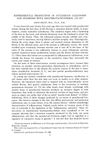 54 citations,
November 1998 in “Archives of dermatology”
54 citations,
November 1998 in “Archives of dermatology” Avoiding certain nutrients and drugs may help manage pemphigus.
 52 citations,
June 1981 in “International Journal of Dermatology”
52 citations,
June 1981 in “International Journal of Dermatology” Oral retinoids are effective for severe skin conditions but require careful use due to side effects.
 50 citations,
October 1918 in “The journal of experimental zoology”
50 citations,
October 1918 in “The journal of experimental zoology” Artificially inducing hair regrowth in mice can change the normal pattern and timing of hair growth, with minimal color differences between old and new fur.
 45 citations,
March 2010 in “Journal der Deutschen Dermatologischen Gesellschaft”
45 citations,
March 2010 in “Journal der Deutschen Dermatologischen Gesellschaft” A systematic approach is crucial for managing hair loss in women.
 45 citations,
January 1998 in “Dermatology”
45 citations,
January 1998 in “Dermatology” Some skin conditions look like acne but are caused by drugs, and they usually get better when the drug is stopped.
 43 citations,
June 2016 in “Clinics in Plastic Surgery”
43 citations,
June 2016 in “Clinics in Plastic Surgery” The conclusion is that fat grafting is safe and effective but carries risks that need careful management.
 42 citations,
February 1985 in “Journal of the American Academy of Dermatology”
42 citations,
February 1985 in “Journal of the American Academy of Dermatology” Excessive hair growth can be assessed by history, exam, and blood tests, and treated with medication like dexamethasone, birth control pills, and spironolactone.
 41 citations,
March 2010 in “Psychology Research and Behavior Management”
41 citations,
March 2010 in “Psychology Research and Behavior Management” Using psychological treatments can help manage skin conditions along with regular medical care.
 38 citations,
August 2005 in “Veterinary dermatology”
38 citations,
August 2005 in “Veterinary dermatology” A disease causing skin issues in young adult German short-haired pointers is hereditary, with most affected dogs not responding to treatment.
 33 citations,
August 2006 in “Journal der Deutschen Dermatologischen Gesellschaft”
33 citations,
August 2006 in “Journal der Deutschen Dermatologischen Gesellschaft” Pregnancy can cause specific skin conditions that need correct diagnosis and treatment to protect both mother and baby.
 31 citations,
January 1981 in “Pharmacology & Therapeutics”
31 citations,
January 1981 in “Pharmacology & Therapeutics” Oral retinoids are effective for treating severe skin disorders but have reversible side effects and risks for pregnant women.
 30 citations,
May 2004 in “Journal der Deutschen Dermatologischen Gesellschaft”
30 citations,
May 2004 in “Journal der Deutschen Dermatologischen Gesellschaft” The document concludes that early diagnosis and treatment are crucial for children with hair loss to prevent permanent damage, although not all conditions can be effectively treated.
 24 citations,
May 2010 in “Veterinary dermatology”
24 citations,
May 2010 in “Veterinary dermatology” Oral ciclosporin A and topical treatments both reduce hair loss and scaling in dogs with sebaceous adenitis, but using both together is most effective.
 23 citations,
April 2018 in “Journal der Deutschen Dermatologischen Gesellschaft”
23 citations,
April 2018 in “Journal der Deutschen Dermatologischen Gesellschaft” Permanent hair loss from cicatricial alopecia is treated by reducing inflammation and managing symptoms, but regrowth in scarred areas is unlikely.
 21 citations,
October 2011 in “PloS one”
21 citations,
October 2011 in “PloS one” Certain molecules in hair change with age and could be used for cosmetic treatments.
 20 citations,
September 2016 in “Journal der Deutschen Dermatologischen Gesellschaft”
20 citations,
September 2016 in “Journal der Deutschen Dermatologischen Gesellschaft” Germany recognizes skin cancer from UV exposure as an occupational disease, emphasizing prevention and care for affected workers.
 19 citations,
February 2015 in “Contact dermatitis”
19 citations,
February 2015 in “Contact dermatitis” Avoiding certain fragrances improved the man's skin condition.
 19 citations,
October 2008 in “Journal der Deutschen Dermatologischen Gesellschaft”
19 citations,
October 2008 in “Journal der Deutschen Dermatologischen Gesellschaft” Anti-cancer treatments can cause reversible hair loss, skin sensitivity, pigmentation changes, nail damage, and skin reactions, with a need for more research on managing these side effects.
 17 citations,
December 2003 in “Veterinary dermatology”
17 citations,
December 2003 in “Veterinary dermatology” Some masked palm civets in Japan have a skin disease caused by mites.
 17 citations,
August 1983 in “Australasian Journal of Dermatology”
17 citations,
August 1983 in “Australasian Journal of Dermatology” The review says skin conditions with sterile pustules need more research for better treatments.
 16 citations,
August 2018 in “Journal of empirical legal studies”
16 citations,
August 2018 in “Journal of empirical legal studies” Repealing tampon taxes helps low-income people the most by making menstrual products cheaper.
 16 citations,
September 2015 in “Journal of Ethnopharmacology”
16 citations,
September 2015 in “Journal of Ethnopharmacology” The document concludes that "Dictamnus" has a rich cultural history and potential as a herbal medicine, warranting more research into its effects and safety.
 16 citations,
September 1964 in “The journal of investigative dermatology/Journal of investigative dermatology”
16 citations,
September 1964 in “The journal of investigative dermatology/Journal of investigative dermatology” New compounds can block testosterone effects in rats and might help treat conditions like prostate cancer and acne.
 15 citations,
September 2018 in “Dermatologic therapy”
15 citations,
September 2018 in “Dermatologic therapy” Both emollients effectively reduced itching and improved skin moisture in xerotic eczema.
 15 citations,
May 2011 in “Veterinary Dermatology”
15 citations,
May 2011 in “Veterinary Dermatology” Vitamin A might be a safe extra treatment for dogs with sebaceous adenitis, but more research is needed to prove its effectiveness.
 15 citations,
January 1998 in “Journal of Clinical Periodontology”
15 citations,
January 1998 in “Journal of Clinical Periodontology” Finasteride helps treat hair loss by blocking enzyme activity.
 14 citations,
December 2010 in “Seminars in Oncology”
14 citations,
December 2010 in “Seminars in Oncology” Rare adrenal cancers that secrete androgens or estrogens have a poor prognosis and are treated primarily with surgery.
 12 citations,
July 2015 in “Veterinary Dermatology”
12 citations,
July 2015 in “Veterinary Dermatology” Microneedling helped two Pomeranian dogs with a hair growth disorder grow back 90% of their fur in 12 weeks, and the results lasted for a year.
 12 citations,
January 2013 in “Bundesgesundheitsblatt - Gesundheitsforschung - Gesundheitsschutz”
12 citations,
January 2013 in “Bundesgesundheitsblatt - Gesundheitsforschung - Gesundheitsschutz” Older adults still engage in sexual activities but face challenges like health issues and lack of professional support, highlighting the need for better healthcare provider education and research on sexual fulfillment in old age.
 12 citations,
July 1957 in “Journal of Investigative Dermatology”
12 citations,
July 1957 in “Journal of Investigative Dermatology” Giving dihydrotachysterol to mother rats caused skin hardening and bone issues in their babies through milk.






























